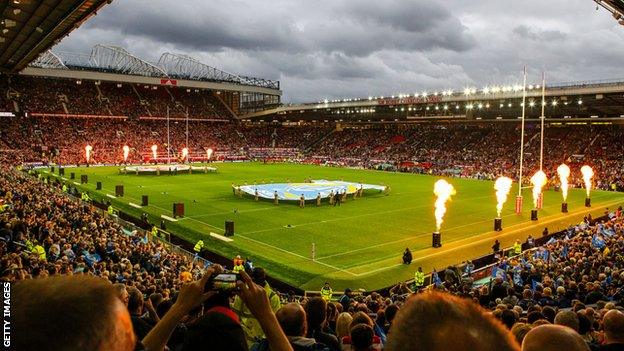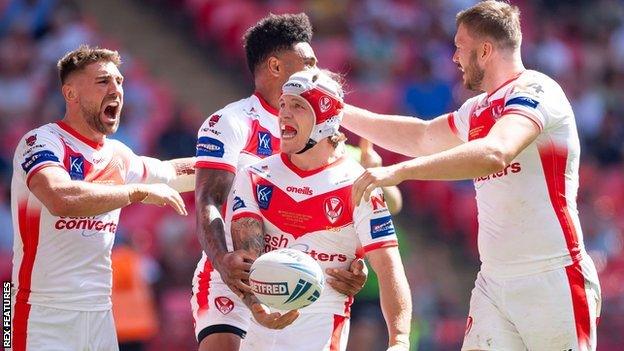Rugby League: World Cup and new terrestrial TV coverage provide reasons for optimism in 2022
- Published

Old Trafford, the traditional home of the Super League Grand Final, will again host the World Cup final in November, having previously been the venue for the showpiece in 2013 when Australia beat New Zealand
Betfred Super League 2022 |
|---|
Kick-off date: Thursday, 10 February Coverage: Live commentary on BBC Radio 5 Live, Sports Extra and local radio; highlights on BBC One, BBC Two and iPlayer from the Super League Show, and news and reports on the BBC Sport website and app |
An air of guarded optimism surrounds rugby league as 2022 gets into full swing.
It's almost unnerving, given the levels of negativity and disunity that have swirled around the sport in the past few years.
But with a World Cup back on the horizon, a new terrestrial TV deal that could give the game more visibility and a slow move towards engaging with a "corporate partner" that could help maximise the sport's ability to maximise its commercial potential, the signs are promising.
There was much justifiable gnashing of teeth when the original 2021 version of the World Cup was put on hold. Australia and New Zealand pulled out, pointedly using Covid as an excuse and suggested it made the tournament impractical. The organisers argued otherwise.
But they might have done us a favour. The 2022 version - men's, women's and wheelchair events, together like never before - should hopefully be played in an environment that allows maximum engagement with fans and communities that might not have been possible last autumn.
And the profile it will get? Well, wow! Every match will be available to watch on a BBC platform, with more than half of the 61 matches going out live on terrestrial BBC TV.
For five weeks or so in October and November, the normally disinterested larger population of these isles will often switch on their TVs, on their regular channels, to find a rugby league match of some description beaming back at them.
It will then be up to the home nations competing on the various stages to produce the goods that could engage that new audience and interest and encourage it to stay well beyond the November finals.
More TV coverage than ever before
The BBC will also be providing its normal coverage of the domestic game.
The Super League Show - covering every match, every try through to the Grand Final - will have a new slot on the BBC iPlayer every Monday at 19:00 GMT and later BST before also going out on TV.
Streaming of the early rounds of the Challenge Cup are already under way. And that competition moves to BBC One and BBC Two from the sixth round in March, all the way to the final at the new Tottenham Hotspur Stadium on 28 May.
That will include live coverage on BBC One and BBC Two of the triple header of women's Challenge Cup final and both men's semi-finals at Elland Road on Saturday, 7 May.
Not to mention the extensive coverage of matches on BBC Radio 5 Live Sports Extra and local BBC radio.

St Helens beat Castleford in the Challenge Cup final last season on their way to a league and cup double - but who will lift the famous old trophy at the Tottenham Hotspur Stadium in May?
Sky TV's coverage, the financial mainstay of the game, remains as committed as ever, showing at least two matches a week.
But added to the mix this year is the intriguing prospect of 10 Super League matches live on Saturday and Sunday afternoons, dotted through the campaign, on Channel 4. Hosted by comedian Adam Hills,, external it will be a first live terrestrial outing for Super League.
There is a promise of a new audience from outside the rugby league bubble.
Even the Championship has its own TV deal with a subscription channel.
There has never been so much rugby league on TV and radio.
New investment on the horizon?
Much was made of the possible introduction of corporate finance to the game last year. The Rugby Football League and Super League are continuing to seek out bringing in some added expertise and possibly wealth.
The inside whispers are that the search is nearing completion and recommendations and revelations on that should be made pubic sooner rather than later. It may not bring a huge injection of funding in the first instance, but the commercial and marketing support may prove to be invaluable.
And if you have been waiting for the much-heralded realignment of Super League and the RFL, then you will have to be patient for a little while longer.
It was promised to be done by Christmas; it has still not been finalised. But again, the word from within is that the two sides are creeping towards a settlement that should see them working from a united base very soon.
They need to get on with it. But with that realignment, more key decisions will be made from an independent, game-wide viewpoint, taking power away from the individual clubs who have been rightly accused of applying too much self-interest to their decision-making in the recent past.
The game is still in a tough place. Plenty of clubs, especially the bigger clubs, have taken a big hit during the travails of the last couple of Covid-hit years.
But the signs of green shoots of recovery are there, and, who knows, it could be blooming marvellous by this time next year.
